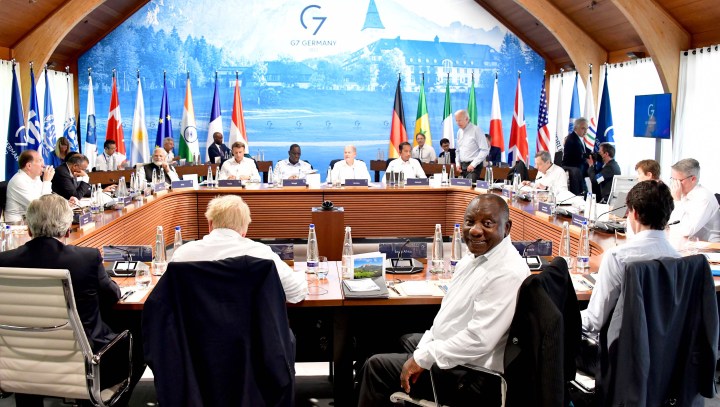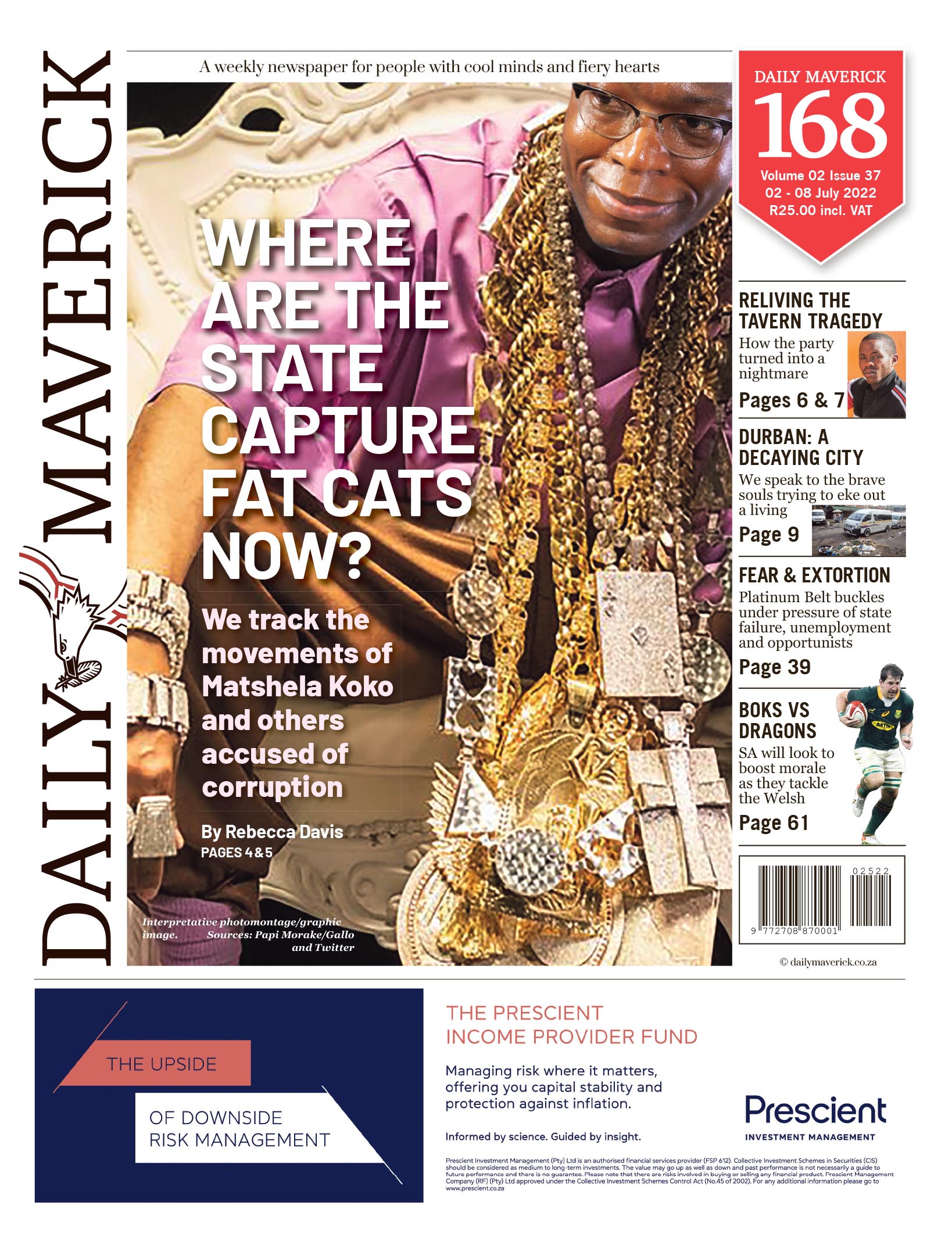A WORLD OF TROUBLE
Stumbling bloc – Pretoria walks a tightrope between BRICS and the G7

The gap is widening as the BRICS back Russia despite – or perhaps because of – Ukraine. Pretoria recognises that the ‘delicate balance’ between its membership of the bloc and its good relations with the G7, is going to become ever more difficult to maintain.
As BRICS throws more of its weight behind its warring member Russia, South Africa is walking an increasingly fine line between its membership of this bloc of five emerging and developing nations and its good standing with the G7 and the West more generally.
Pretoria’s delicate balance in straddling the widening East-West divide was on display last week as President Ramaphosa first attended the virtual BRICS summit hosted by Chinese President Xi Jinping and then participated in person in the G7 summit hosted by Chancellor Olaf Scholz at Schloss Elmau in Bavaria.
At the BRICS summit, also attended by Indian Prime Minister Narendra Modi and Brazilian President Jair Bolsonaro, Russian President Vladimir Putin pushed hard for a raft of joint BRICS measures that would in effect help Russia circumvent the sanctions that Western countries have imposed on that country because of its invasion of Ukraine. Putin’s measures would collectively reduce the role of the US dollar in financial transactions between BRICS member states
These measures included an alternative mechanism of payment, which would entail all other BRICS countries joining the Russian central bank’s MIR electronic fund transfer system which it introduced in 2017 to bypass the initial tranche of Western sanctions imposed after Russia invaded and annexed Ukraine’s Crimea peninsula in 2014. MIR enables Russia’s banks to issue and manage credit cards.
Putin also invited the other BRICS countries to join Russia’s financial messaging system – its alternative to the international SWIFT ( Society for Worldwide Interbank Financial Telecommunications) system which Western countries cut Russia out of in 2022.
South African officials note that the strong new impetus for expansion and deeper cooperation in 2022 had mostly come from Russia and China – in contrast to their previous reluctance to strengthen and broaden BRICS
The BRICS leaders also agreed to deepen the use of their own currencies – rather than the US dollar – in transactions among themselves. And Putin also pushed for the creation of an international reserve currency based on the basket of BRICS currencies, also to reduce the influence of the dollar.
Officials said the five BRICS leaders also discussed the creation of a BRICS credit-rating agency.
Another major decision of the summit was to start the process of expanding the membership of the bloc.
De-dollarisation
The ideas Putin pushed were not new, says Karin Costa Vazquez, senior fellow at the Center for China and Globalization, of China’s Fudan University and executive director at India’s OP Jindal Global University.
“These proposals are a response to the five countries’ long-term goal to reduce currency risk and foster intra-BRICS trade.
“This is particularly relevant as the world struggles with the impacts of the Ukraine war on key global supply chains, the surge in energy and food prices, and the weakening of the conditions that could generate a global economic recovery.
“I believe a major challenge ahead of the bloc will be to advance the de-dollarisation of trade and transactions as a legitimate effort from emerging markets and developing countries.”
Read in Daily Maverick: “BRICS leaders skirt the war in Ukraine, throw shade at Western sanctions against Russia”
South African officials suggest, however, that the Ukraine war – and the West’s sanctions against Russia because of it – have given new impetus to these proposals.
They noted it was South Africa that proposed some of these ideas when it last chaired BRICS in 2018. Then president Jacob Zuma had pushed hardest for a BRICS credit-rating agency, for example, because the usual West-based agencies were hammering South Africa.
But Russia wasn’t very keen then so South Africa dropped the plan. At the 2018 summit in Johannesburg, Pretoria had also proposed expanding the membership of BRICS. But some of the other members – notably again, Russia and China – were not enthusiastic. The summit decided instead to consolidate and shelve discussion about expansion. South African officials note that the strong new impetus for expansion and deeper cooperation in 2022 had mostly come from Russia and China – in contrast to their previous reluctance to strengthen and broaden BRICS.
They believe Russia’s isolation from the West because of its invasion of Ukraine is indeed driving it towards a closer embrace of a stronger BRICS.
And Vasquez concedes that the older proposals for greater economic independence of the BRICS countries do “ gain new impetus with the war. The hegemony of the US dollar is a precondition for any economic sanction to be effective.
“Thus, if there is one thing Russia could do to weaken the effect of US sanctions, that would be to de-dollarise trade and transactions with other countries and playing the BRICS card is one way to advance it.
“But remember that Russia and China have been cooperating bilaterally on this same issue for the past five years and that there have been several studies and discussions within the BRICS Central Banks for quite some time, too.
“This is to say that I do not agree with the argument that Putin is drawing the other countries into initiatives to help him circumvent Western sanctions. This might be Russia’s short-term goal, but looking at the bigger picture, it responds to the bloc’s goal to offer an alternative to the international financial system and global economic governance.”
But short-term or long-term, it seems pretty clear that the war and sanctions are pulling the BRICS countries closer together – as well as changing their attitude to expansion.
Sources say there had been a general condemnation by the five leaders at the summit of the “unilateral” sanctions imposed on Russia by the West, and a decision to deepen cooperation among the BRICS states in response.
Argentinian President Alberto Fernández, who participated in last week’s summit as one of the guests, was most vocal in seeking membership. Mexico, Egypt and Indonesia are also pushing hard to join.
And Moscow and Tehran announced after the summit that Iran had applied to join – even before BRICS has formally decided to expand. “While the White House was thinking about what else to turn off in the world, ban or spoil, Argentina and Iran applied to join the BRICS,” Russian foreign ministry spokesperson Maria Zakharova was quoted by Reuters as saying.
Each BRICS member will now propose a new candidate member from its region and so South Africa had begun a process of consultation to decide which African country to put forward.
The BRICS New Development Bank (NDB) has already showed the way by accepting Bangladesh, the UAE, Egypt and Uruguay as members in 2021.
The NDB has also been a pathfinder for BRICS by increasingly lending in local BRICS currencies rather than US dollars. The bank recently announced in its new five-year plan that 40% of its loans would be in local currencies.
“That process is already there so it’s a matter of deepening that process,” one official said.
‘New dynamic’ in the global order
Pretoria is aware that Western governments are looking at this growing BRICS cooperation with some unease because they see it as indirectly supporting Putin’s war in Ukraine.
South Africa expects kickback from the West “which we will deal with as it comes”. But officials note that the reality the West must accept is that there is strong commitment by all five BRICS members to deepen their solidarity, including through financial and economic cooperation.
There is also a greater determination, especially from Russia and China- and to some extent India – to expand BRICS “to bring in a few more weighty countries of the South into the equation to give BRICS even more gravity”.
This is because the Ukraine war and the West’s reaction to it has accelerated “a new dynamic” in the global order.
Pretoria recognises that the “delicate balance” it is already striking between its membership of BRICS and its good relations with the G7, is going to become ever more difficult to maintain. Especiallyin 2023 when South Africa will chair BRICS and so will have to advance the initiatives for expanding and deepening cooperation which Russia and China revived at last week’s summit.
Pretoria is nevertheless confident that its participation in a stronger BRICS will not damage its relations with the West.
Officials note that Ramaphosa was invited to the G7 summit again in 2022 and that South Africa has been the only African country consistently invited to every G7 or G8 summit since 2002, as has India.
Pretoria believes the West still regards South Africa as the essential voice of Africa. And that the quite intense criticism by the West of South Africa’s “non-aligned” stance on the Ukraine war – far more than it has criticised any other African country – is a sign that South Africa matters to the West rather than portending any rift in relations.
Read in Daily Maverick: “BRICS — has South Africa caught a monster by the tail and should it let it go?”
Pretoria suspects that for the West it’s even useful to maintain good relations with South Africa – and India – to keep an eye on what is happening inside BRICS.
Conversely “the G7 and the West is important to us; it’s a major partner of ours. Though at the same time, BRICS is also important for us,” an official says. The result is that South Africa walks a middle path and will continue to do so.
Some South African officials look rather enviously at India which has more adventurously walked the tightrope between BRICS and the West. On the one hand it went as far as joining the Quad alliance with the US, Japan and Australia in 2021, to counter China’s influence in the Indo-Pacific.
One the other hand it has more openly helped Russia, for example by buying Russian oil which has been boycotted by the West. Russia has now become its second-largest supplier after Iraq, overtaking Saudi Arabia. And it is getting that oil at a $30-a-barrel discount, avoiding any energy crisis in India.
At the BRICS summit, Putin announced that Russia had approved India setting up chain stories in Russia, which would presumably also fill the gap left by departing US stores.
Pretoria would also like South Africa to buy discounted Russian oil but says it can’t because, unlike India and China, it doesn’t have its own tankers or insurance companies to underwrite the consignments. It would also like to win business concessions in Russia.
“We need to be smart,” one said, “so we can also take full advantage of the opportunities that are opening up.” DM168
This story first appeared in our weekly Daily Maverick 168 newspaper, which is available countrywide for R25.



















Comments - Please login in order to comment.